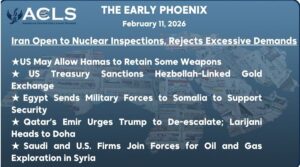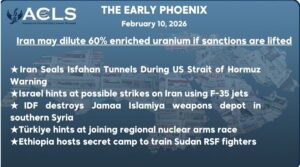
September 26, 2024
DAY III: Operation Arrows Of The North
★ IRAN
-
Khamenei Issues Fatwa For Religious Mobilization Against Israel
A day after President Pezeshkian told over 150 leaders at UNGA Iran seeks peace, Khamenei claimed victory for ‘the Anti-Israel Resistance.'” The 85-year-old, “ideologically obsessed fanatic and warmonger”, issued a religious ruling calling on all Muslims to reclaim Palestine and the Al-Aqsa Mosque, framing the conflict as a religious duty. Khamenei also asserted that Iran’s resistance and powerful global presence has deterred any acts of aggression against Iranian lands. Khamenei included resistance in the West Bank as one of the groups who were able to defeat Israel. He also labeled the United States as an accomplice to Israel, asserting that American support is driven by domestic politics and election needs. The Ayatollah acknowledged the losses of Hezbollah fighters as “damage” but insisted these setbacks are not sufficient to weaken the group’s authority or strength. Khamenei compared this conflict to the 1980 Iran-Iraq war, portraying it as a battle of faith against global superpowers and suggesting the West’s hostility toward Iran arises from opposition to the Islamic Republic’s ideological stance.
-
Iran Conducts Military Training for Palestinian, Yemeni Fighters
Approximately 300 Palestinian and Yemeni fighters are undergoing military training at a base south of Tehran, according to sources. The Shaheed Shabani facility, located 110 km from the Iranian capital, has become a strategic hub for training Iran’s regional allies, including the Houthis, Hezbollah, Hamas, and Palestinian Islamic Jihad. The exercises focus on guerrilla warfare, advanced weapons training, ground assaults, and hostage-taking tactics. The source indicates that this aligns with Iran’s broader effort to strengthen the “Axis of Resistance” against Israel and the U.S. Fighters from Lebanon, Yemen, and Syria have trained at the base over the past year, with some receiving advanced instruction in weapons operation. Iran’s investment in training these allies has raised concerns among neighboring countries and Western powers. The Islamic Republic maintains that its actions are defensive, countering threats from Israel and the West.
-
Trump Warns of Severe U.S. Response to Iran Assassination Threats
Donald Trump suggested the U.S. should “blow Iran to smithereens” if it is involved in harming a White House candidate or ex-president. He shared this after US intelligence warned of a “real and specific” threat aimed at destabilizing the United States. Trump disclosed on social media that Iran’s previous attempts have failed, but further efforts against him are expected soon. At a North Carolina rally, Trump referenced two assassination attempts against him, possibly linked to Iran. He criticized the protection given to Iranian President Pezeshkian during his UN visit, questioning U.S. security priorities. Trump’s call for action aligns with ongoing efforts to prevent regional conflict between Iran-backed Hezbollah and Israel. U.S. Attorney General Merrick Garland condemned the attempts, vowing accountability, and the U.S. recently foiled an Iranian-linked plot to assassinate a U.S. official in revenge for Qassem Soleimani’s 2020 killing. He emphasized being surrounded by more security than ever before, as tensions remain high between Iran and the US. Trump thanked Congress for unanimously approving more Secret Service funding, showcasing rare bipartisan cooperation amid these heightened security concerns.
=====
★ ISRAEL-HEZBOLLAH WAR
-
France, U.S. Propose 21-Day Ceasefire in Lebanon at UN
France’s Foreign Minister Jean-Noel Barrot announced a joint proposal with the U.S. for a 21-day ceasefire in Lebanon at an emergency UN Security Council meeting. The United States distanced itself from Israel’s attacks on Hezbollah positions in Lebanon, stressing no U.S. military involvement. The plan aims to halt hostilities and facilitate diplomatic negotiations between parties involved. UN Secretary-General Antonio Guterres echoed the call for de-escalation, urging that Lebanon should not face a conflict similar to Gaza. Guterres implored all sides to “stop the killing and destruction” and to “step back from the brink” to avoid an all-out war. The ceasefire plan is expected to be published soon.
-
Netanyahu Heads to UN; Israel Prepares for Lebanon Offensive
Prime Minister Benjamin Netanyahu departed for the United Nations with his wife, Sara, making no public comments before boarding. In his absence, Foreign Minister Israel Katz holds the authority to convene the security cabinet. Netanyahu approved talks on a potential deal, on the condition that Israeli civilians are returned home. However, he insisted that strikes on Hezbollah in Lebanon will not cease, telling ministers, “Negotiations will only take place under fire.” Meanwhile, IDF Chief of Staff Lt. Gen. Herzi Halevi announced preparations for a ground offensive against Hezbollah, stating soldiers will enter ‘enemy territory’. The military has also called up two additional reserve brigades to bolster the northern front.
-
Iraqi Militia Drone Hits Eilat Port, Injures Two
The Iraqi Shiite militias launched four attacks from Syria into southern Tiberias, using UAVs and cruise missiles. A drone launched from Iraq struck the Israeli port of Eilat, wounding two civilians and causing damage. The drone strike is part of a series of recent attacks from Iraq, Yemen, and Syria, escalating regional tensions.
-
Israeli Hammer Missiles Against Hezbollah, Simulate 3.6 Earthquakes
Israeli missile strikes on Hezbollah targets recently caused unusual tremors in Lebanon, alarming residents. These “Sharon seismic missiles,” designed to destroy underground tunnels, penetrate deep up to 30 meters underground and produce wide craters. The missiles, equipped with JDAM guidance systems, convert standard bombs into precision “smart” weapons with GPS control, enhancing their ability to target and destroy deep fortifications. Weighing up to 10 tons with a 9-kilometer range, they simulate a 3.6 magnitude earthquake upon detonation, resulting in significant damage to buildings, tunnels, and critical infrastructure.
-
Over 90,000 Displaced in Lebanon Due to Israeli Raids
The United Nations reported that over 90,000 people have been displaced in Lebanon since Monday due to intensified Israeli raids amid ongoing clashes with Hezbollah. According to the International Organization for Migration, these displacements are part of over 111,000 people who have fled since the escalation between Hezbollah and Israel began on October 8. This brings the total number of displaced Lebanese to over 200,000. Lebanese Foreign Minister Abdullah Bou Habib suggested the current figure may be nearing half a million displaced individuals.
-
Blinded Casualties from Grim Beeper Operation Rise to 1,500
Reuters reported that 1,500 Hezbollah members were blinded or lost hands due to recent radio explosions. A Norwegian police security specialist confirmed a preliminary investigation into reports of a Norwegian company’s potential involvement in selling wireless communication devices, including pagers, to Hezbollah. Thousands of pagers and walkie-talkies exploded across Lebanon over two days last week, killing at least 39 people and injuring thousands.
-
Israeli Defense Minister Gallant Excluded from Security Meetings
Defense Minister Yoav Gallant was excluded from three security meetings led by Prime Minister Netanyahu, likely due to tensions over Gallant’s criticism of the judicial overhaul. The meetings, involving key ministers like Foreign Minister Katz and Justice Minister Levin, occurred on Wednesday, Saturday, and Sunday. Netanyahu reportedly aims to replace Gallant, with Katz and Agriculture Minister Avi Dichter as potential candidates. Meanwhile, the security cabinet is expected to discuss granting authority for a ground operation against Hezbollah.
=======
★ ISRAEL-HAMAS WAR
-
Hamas and Fatah Agree To Civil Administration For Gaza
A Hamas source revealed to Al Arabiya that Hamas and Fatah have agreed on a civil administration for Gaza, with Hamas not overseeing the crossings. A meeting between the two factions is set for next week as part of reconciliation talks. Discussions focus on the future management of Gaza, including proposals for a local administrative body of independent figures, a technocrat government approved by all factions, or a local entity supervised by the current government. The move comes as Israel strongly opposes any role for Hamas or the Palestinian Authority in managing Gaza, pushing the factions to form a local administration to avoid legal issues. The factions held previous reconciliation talks in Beijing, signing the “Beijing Declaration.”
-
Police Uncover Cannabis Tunnel with 400 Plants In Negev
Police discovered a 50-meter underground tunnel in the Negev containing a cannabis greenhouse with around 400 marijuana plants, each standing about a meter tall. The structure, partially covered by a fabric sheet, was equipped with an irrigation system. The plants and greenhouse are slated for destruction. Earlier in September, another underground drug lab in the Negev, containing over 600 plants and distribution equipment, was seized, valued at over one million shekels. The Arad station police and Border Police officers were involved in uncovering both facilities.
======
★ EGYPT & AFRICA
-
U.S. State Department Approves $740 Million Sale of Stinger Missiles to Egypt
The U.S. Department of Defense announced on Tuesday that the State Department has approved a potential sale of Stinger missiles to Egypt for $740 million. These missiles are in high demand, particularly in Ukraine, due to their effectiveness in deterring Russian air attacks. European nations, wary of potential Russian aggression, also seek such defenses. Egypt plans to mount the Stinger missiles on vehicles equipped with the Avenger launch system, rather than using traditional shoulder-fired launchers.
=====
★ GULF NATIONS
-
Aramco and Chinese Group Sign Strategic Cooperation Agreement
Saudi Aramco signed a five-year agreement with China’s National Building Materials Group to explore advanced materials and establish manufacturing facilities in Saudi Arabia for wind turbine blades, hydrogen tanks, low-carbon materials, and energy storage. The deal also includes creating a training and inspection center for materials certification. This cooperation aims to reduce emissions, improve construction efficiency, and strengthen strategic ties between Saudi Arabia and China through innovative material development.
===============
DayII: Operation Arrows of The North: Israel Intercepts Missile Over Tel Aviv, Launches Strikes in Lebanon
Must Read: From Trump to Biden: The Evolution of U.S. Policy and Its Effects on Sino-Iranian Oil Trade



